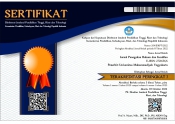Diskresi Kepolisian melalui Mediasi Penal (Studi Kasus di Polsek Galur, Kulonprogo)
DOI:
https://doi.org/10.18196/jphk.1206Abstract
Penelitian ini dilakukan untuk mendeskripsikan dan menganalisis pelaksanaan mediasi penal yang dilaksanakan berdasarkan diskresi oleh perpolisian masyarakat di Polsek Sektor Galur beserta faktor pendukung dan penghambat dari pelaksanaan mediasi penal oleh perpolisian masyarakat di Polsek Galur. Di akhir tulisan disampaikan rumusan pola ideal mediasi penal yang dilaksanakan berdasarkan diskresi oleh kepolisian masyarakat di masa mendatang. Metode penelitian hukum yuridis-empiris (socio-legal research) menemukan fakta empiris bahwa pelaksanaan mediasi penal berdasarkan diskresi oleh Polsek Sektor Galur dilaksanakan melalui institusi perpolisian masyarakat dengan melibatkan banyak pihak, antara lain pihak pelaku dan korban, juga melibatkan stakeholder seperti tokoh masyarakat dan tokoh agama yang tergabung di FKPM. Faktor pendukung pelaksanaan mediasi pidana oleh Kepolisian Sektor Galur adalah diberikannya kebebasan kepada pihak kepolisian pada saat pelaksanaan segala tugas, kewajiban dan wewenangnya dalam penegakan hukum dan sebagai petugas penyidik. Akantetapi sarna dan prasarana; dukungan masyarakat; budaya yang tumbuh di masyarakat; dan keberadaan institusi kepolisian menjadi faktor penghambat pelaksanaan mediasi penal. Pola ideal diskresi yang diusulkan oleh penulis terkait dengan pelaksanaan mediasi penal adalah netralitas atau ketidakberpihakan mediator yang ditunjuk terhadap pelaku maupun korban. Kata Kunci: Diskresi, Mediasi Penal, Perpolisian Masyarakat.Downloads
Additional Files
Published
2020-08-24
Issue
Section
Article
License
Copyright statementAuthors who publish with JURNAL PENEGAKAN HUKUM DAN KEADILAN agree to the following terms:
- Authors retain copyright and grant the journal right of first publication with the work simultaneously licensed under a Creative Commons Attribution License that allows others to share the work with an acknowledgement of the work's authorship and initial publication in this journal.
- Authors are able to enter into separate, additional contractual arrangements for the non-exclusive distribution of the journal's published version of the work (e.g., post it to an institutional repository or publish it in a book), with an acknowledgement of its initial publication in this journal.
- Authors are permitted and encouraged to post their work online (e.g., in institutional repositories or on their website) prior to and during the submission process, as it can lead to productive exchanges, as well as earlier and greater citation of published work (See The Effect of Open Access).
License
This journal is using Attribution-NonCommercial-ShareAlike 4.0 International. You are free to:- Share — copy and redistribute the material in any medium or format
- Adapt — remix, transform, and build upon the material
- Attribution — You must give appropriate credit, provide a link to the license, and indicate if changes were made. You may do so in any reasonable manner, but not in any way that suggests the licensor endorses you or your use.
- NonCommercial — You may not use the material for commercial purposes.
- ShareAlike — If you remix, transform, or build upon the material, you must distribute your contributions under the same license as the original.
- No additional restrictions — You may not apply legal terms or technological measures that legally restrict others from doing anything the license permits.

JPHK is licensed under a Creative Commons Attribution-NonCommercial-ShareAlike 4.0 International License.

